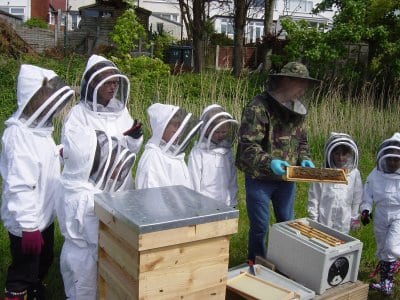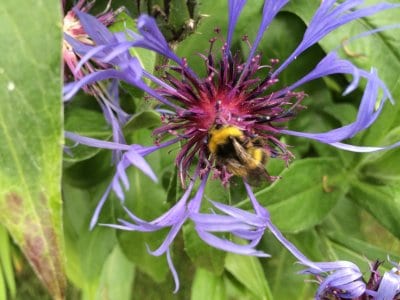The Layton Bee Project can be found on the Nature Reserve at the bottom of the Layton Allotments site.
It’s run by apiarist Mica Goldstone and Jane Keane. It’s an educational and environmental project for local schools and children’s groups to come and learn all about bees.
Mica is a governor at Layton School, so when the allotment got a grant for small trees back in November she organised a visit so that a class could plant them. They were really enthusiastic despite it being somewhat cold! At the time Mica showed the children her hives at the allotment and many were fascinated.
Mica says “When the opportunity for funding came up members of the allotment, notably Jane Keane, Isabel and John Horn got together and we applied with the intention of creating a community apiary on the allotment site so members could learn about beekeeping, but also offer the opportunity for children from schools to visit. We were successful and now have two hives and more than a dozen children’s suits.”
The project is still in its very early days, but a few schools and social clubs (scouts etc) have been in touch and made arrangements to come along for a visit over the next few months.
Hopefully the hives will produce honey, the sale of which will subsidize the purchase of equipment, and this will enable the team to expand the project.
Why Bees are so Important
Bees are vital to our food chain. If it weren’t for bees, one third of the food we eat wouldn’t be there.
About 70 crops in the UK are dependent on, or benefit from visiting bees. They also pollinate the flowers of many plants which become feed for farm animals. The value of bees as pollinators of commercial insect pollinated crops has been estimated at over £200 million per year.
However, our buzzy friends are in danger. Farming practices disturb the habitat of solitary and bumble bees and the honey bee is under attack from the varroa mite. It’s only the treatment and care of bee keepers which is keeping colonies alive, with most wild honey bee colonies having already died out as a result of this disease.
It’s vital that people understand the value of bees and the threat to their existence so that we can continue to produce food for the future. Which is why projects like this one are so important in showing future generations the fascinating world of the bee.
Did you know that a bee will only usually sting you if provoked? Unlike a wasp, when a bee stings it cannot pull the barb out of your flesh, leaving it behind along with it’s insides, and so the bee dies.
Leave a bee alone and it will just go about its business and happily ignore you!










